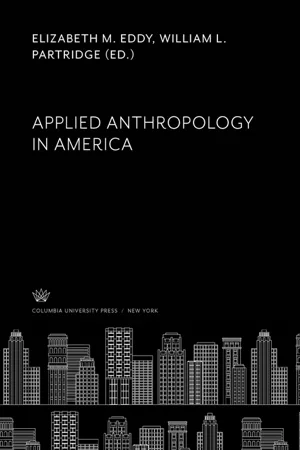
eBook - PDF
Applied Anthropology in America
This is a test
- 574 pages
- English
- PDF
- Available on iOS & Android
eBook - PDF
Applied Anthropology in America
Book details
Book preview
Table of contents
Citations
About This Book
Describes the development of applied anthropology, what it is, and how applied anthropologists differ from other anthropologists. Gives numerous examples of how each subfield is represented in applied employment in the United States.
Frequently asked questions
At the moment all of our mobile-responsive ePub books are available to download via the app. Most of our PDFs are also available to download and we're working on making the final remaining ones downloadable now. Learn more here.
Both plans give you full access to the library and all of Perlego’s features. The only differences are the price and subscription period: With the annual plan you’ll save around 30% compared to 12 months on the monthly plan.
We are an online textbook subscription service, where you can get access to an entire online library for less than the price of a single book per month. With over 1 million books across 1000+ topics, we’ve got you covered! Learn more here.
Look out for the read-aloud symbol on your next book to see if you can listen to it. The read-aloud tool reads text aloud for you, highlighting the text as it is being read. You can pause it, speed it up and slow it down. Learn more here.
Yes, you can access Applied Anthropology in America by Elizabeth M. Eddy, William L. Partridge, Elizabeth M. Eddy, William L. Partridge in PDF and/or ePUB format, as well as other popular books in Social Sciences & Cultural & Social Anthropology. We have over one million books available in our catalogue for you to explore.
Information
DEVELOPMENT
OF
APPLIED
ANTHROPOLOGY
55
strictures
of
time,
personnel
shortage,
and
overload
favor
the
use
of
familiar
binary
logics.
Nevertheless,
anthropologists
who
are
sensi-
tive
to
this
fact
work
hard
to
learn
the
language
and
concerns
of
policy
makers
and
examine
carefully
the
several
levels
at
which
pol-
icies
are
made
and
modified.
By
bringing
policy
formulation
into
the
realm
of
empirical
analysis,
applied
anthropologists
often
discover
creative
ways
to
become
engaged
in
the
policy
process
itself.
Students
of
anthropology
and
professional
anthropologists
who
are
planning
careers
in
applied
anthropology
require
training
in
the
dialogue
between
application
and
theory
construction,
the
practice
of
anthropology
in
modern
institutions
and
the
communities
they
im-
pact,
and
the
critique
and
production
of
public
policy.
This
volume
cannot
and
does
not
cover
all
fields
of
endeavor
in
which
applied
anthropologists
contribute
to
theory
and
practice,
but
it
explicitly
pro-
vides
a
guide
to
these
three
major
areas.
Table of contents
- Contents
- Preface
- Introduction
- 1. The Development of Applied Anthropology in America
- Part I. The Dialogue Between Theory and Application
- 2. Theoretical Contributions of Industrial and Development Studies
- 3. Multiculturalism as the Normal Human Experience
- 4. The Elusive Nature of Cooperation and Leadership: Discovering a Primitive Process that Regulates Human Behavior
- 5. Developing Anthropological Knowledge Through Application
- 6. Policy and Social Theory in Anthropology
- 7. Organizational Behavior Research: Changing Styles of Research and Action
- 8. Opportunities, Issues, and Achievements in Development Anthropology Since the Mid-1960s: A Personal View
- 9. Toward a Theory of Practice
- Part II. Practicing Anthropology
- 10. The “Production” of a Social Methodology
- 11. The Changing Role of an Applied Anthropologist
- 12. Learning to be an Anthropologist and Remaining “Native”
- 13. Administrative Orientations from Anthropology: Thoughts of a College President
- 14. Practicing Medical Anthropology: Clinical Strategies for Work in the Hospital
- 15. The Ethnographic Evaluator
- 16. Taking the Witness Stand
- Part III. Practicing Anthropology and Public Policy
- 17. Anthropology as a Policy Science
- 18. Ethnicity, Public Policy, and Anthropologists
- 19. Vicos: Success, Rejection, and Rediscovery of a Classic Program
- 20. Applying the Anthropological Perspective to Social Policy
- 21. Service, Delivery, Advocacy, and the Policy Cycle
- 22. Toward a Framework for Policy Research in Anthropology
- Bibliography